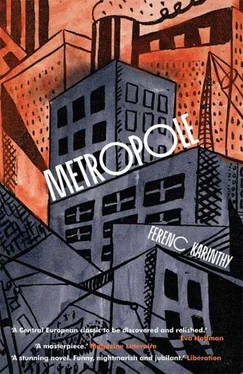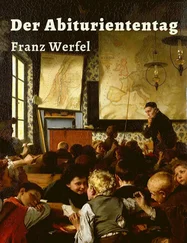Ferenc Karinthy
Metropole
Looking back on it later it could only have happened because Budai had gone through the wrong door in the confusion at the transit lounge and, having mistaken an exit sign, found himself on a plane bound elsewhere without the airport staff having noticed the change. After that it was impossible to say how far or for how long he had flown, for as soon as the engine purred into life he reclined his seat and fell asleep. He was quite exhausted, hardly having rested the last few days, working himself to a standstill, and apart from anything else there was the speech for the linguistic conference in Helsinki for which he had just now been preparing. He was woken only once during the flight when they brought him his meal, then he promptly fell asleep again, it might have been for ten minutes or for ten hours. He didn’t even have his wristwatch with him since he intended buying one out there and didn’t want to have to present two watches at customs back home, so he didn’t have the least clue how far he was from home. It was only later, once he was in town, that he discovered it wasn’t Helsinki and was shocked that he didn’t know where he actually was. The passengers had been put on board a bus at the airport. It was dark; a cold and windy evening, or perhaps it was already night and he was still half asleep. The bus stopped in various places and a lot of people got out. Budai had been in Helsinki before but now he sought in vain for familiar buildings or the seafront. At one of the stops everyone got off, including the driver, who gestured for him to do likewise. He found himself at the glass doors of a hotel with great crowds of people pressing past him, quickly separating him from his fellow passengers, and it took him a good while to push through the crowd flowing both ways. The doorman, an enormous portly figure wearing a fur coat and a gold-braided cap, greeted him courteously and opened the swing door before him, but when Budai addressed him in Finnish he plainly did not understand and answered in an unknown language, ushering him into the lobby where the influx of new guests prevented further conversation.
There was a crowd gathered by the hotel reception as well so he had to join the queue and, by the time he found himself face to face with the grey-haired desk-clerk, a man in a dark-blue uniform, there was a large, noisy family — mother, father, three unruly children, plus a mass of luggage — all squashed up behind him, practically pushing him forward with barely disguised impatience. From this point on everything speeded up. He tried to address the receptionist in Finnish, then in English, French, German and Russian, all clearly to no avail since the man replied in a different unknown language. So he showed the man his passport and the desk-clerk took it from him, no doubt to jot down the details, handing him a copper-weighted key in return. Budai had slipped his dollar cheque, the daily stipend for trips abroad, into his passport, and the porter took that too, then consulted his pocket calculator, read off the result and quickly filled out a pre-stamped form which must have been a credit note in the local currency, or so Budai guessed from his rapid gabble. He tried protesting that he didn’t want to cash his cheque in now but no one understood him and since the loud and large family behind him were growing ever more impatient, waving documents, the children screaming, and since the desk-clerk was pointing to the neighbouring cash-desk, Budai gave up the struggle, let the family through and stepped over to the next window.
There was a similarly long queue there moving at snail’s pace so he took his place at the end ever more irritated, thinking he would have to undergo the same idiotic procedure all over again. The clerk here simply gabbled the same incomprehensible language. Once again he had no time to explain, not that he had any clear idea what it was he wanted to explain nor what language to attempt. The upshot was that he was given a wad of unused banknotes, some bigger, some smaller, a few screwed-up ones and half a fistful of change in coins that he pocketed along with the notes without examining them closely. This was all quite ridiculous and infuriating of course but he had only just begun to speculate on what might have happened. Maybe the weather was bad in Helsinki and the flight had been diverted and that was why they had landed in some other town. But, surely, in that case his luggage would have been returned to him, yet all he had with him now was the little case he had carried on board and had stowed in the compartment over his head. Whichever way he looked the only conclusion he could come to was that he had boarded the wrong flight in transit which meant his suitcase must have arrived in Helsinki without him, though now he came to look for it he could not find his ticket either, nor could he remember anyone taking it from him at the airport. That presented a serious problem since he had left his personal ID and other papers at home, shoving them into a drawer at the last minute, so he was without any documents. But that wasn’t what most agitated him right now, that could be sorted out later; what mattered was that he should get to Helsinki as soon as possible. In order to do that he first had to explain to the relevant authorities how he had arrived here and from where, which entailed locating those appropriate authorities who would, most probably, be the representatives of the airline. Unfortunately he had no idea where to find them. The queue at reception was even longer than before so he had no desire to join it again, indeed all the windows were fully occupied, and he couldn’t work out which window was for what and where he should go for mere information. There were notices here and there over particular windows along the long desk but he could not make them out, the letters being of some unknown alphabet, as were the captions under the pictures hanging on the walls, the messages of the posters and the text of the newspapers and magazines at the newsagent’s counter. In any case he was unable to examine them properly because the lobby was full of the dense, constantly shifting crowd and whenever he tried to stand still he was jostled and swept along elsewhere. So he decided to wait and arrange things by telephone from his room.
The copper weight on his key said 921 so he guessed the room would be on the ninth floor. He found the lifts at the end of the lobby though only three of the eight seemed to be working and each of those had a large group of people waiting by it. Budai would have gone up by the stairs but casting his eyes round for the stairs he couldn’t see them and he was unwilling to lose his place in the queue. It took another quarter of an hour before he managed to get into the lift which was so full that there was no room to move. The blue-uniformed lift girl was tall, young and blonde. She called out in her mysterious language, announcing the floors, and indeed they seemed to stop at every one. But as soon as the compartment emptied it filled up again since a whole new crowd piled in at each floor. There was a small, working ventilator fixed to the wall next to the girl yet Budai couldn’t help wondering how she could work in such a stuffy, airless compartment with such a constant press of people, working perhaps for hours at a time or on an entire shift. But he quickly dismissed the thought: it wasn’t his problem, he was going to be away from here, today with a bit of luck, by tomorrow morning at the latest. He signalled that he wanted to get out at the ninth floor and squeezed out with the rest when they arrived, their places being immediately occupied by others. He met no one in the corridor as he searched for his room, wandering to and fro, counting forward and back in the attempt to locate room 921. There was always a doorway or a junction that broke the sequence and he could not pick it up again. Twice he found himself back at the lift until he finally stumbled on 921 at the very end of a distant branch corridor.
Читать дальше












